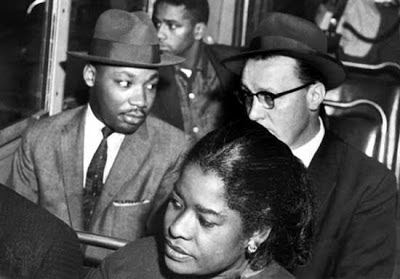That fact came out the next morning in the New York Times. Shortly thereafter Martin received a letter from a ninth grade white girl from White Plains High School. Many times thereafter he liked to quote the last line of her letter to him. "I'm simply writing you to say that I'm so happy that you didn't sneeze."
With all of these events Martin was becoming more and more known throughout the world. On February 18, 1957 his picture appeared on the cover of Time Magazine.
He kept receiving invitations to speak all around the country, and eventually the world.
Martin struggled to fulfill all of these commitments and still faithfully serve the members of Dexter Avenue Baptist Church. In his latter years there in his annual reports to the congregation he would talk about the guilt he felt at being away from his congregation so much.
Throughout life, whatever our particular calling is at that time, we struggle to know how long to stay in a particular calling, and when it may be time to change. This happened to Martin at Dexter. Not only did he feel he was not adequately fulfilling his call there, but he longed for more time to read, write, reflect, pray, and provide leadership to the Southern Christian Leadership Conference (SCLC).
Finally, in early 1960, Martin resigned his call to Dexter, and he and his family moved to Atlanta. He became co-pastor at Ebenezer Baptist Church with his Father, who promised that in that position he would have more time for his work outside the parish and as president of the SCLC.




No comments:
Post a Comment